Strengthen and Harmonize Research and Action on Migration (SHRAMIC) organised a half-day event on 13 February 2015 at the India Habitat Centre in New Delhi. Focusing on the theme of labour markets, the workshop brought together over 70 government officials, policymakers, NGOs, academicians, researchers, social entrepreneurs and corporations to focus on the role of labour markets in improving migration outcomes for the large number of labour migrants in India.
A Special issue of Urban India, a bi-annual journal of National Institute of Urban Affairs, on the subject of Internal Migration in India, was released at the event. The issue is a collection of select published research papers from a network of 67 migrant resource centres across India offering insights from the field on critical issues related to labour migration, employment and urbanisation.
Inaugural Session
Placing the issue of labour migration in context, the inaugural panel focused on the links between urbanization and migration, India’s labour landscape and salient issues, the current government’s thinking on the role of labour policy in shaping migration experiences and outcomes and the importance of synergizing policy conversations with grassroots efforts.
Prof. Jagan Shah, Director, NIUA, highlighted the role of the government and new institutions in integrating migrants into the mainstream economy, especially in the context of smart cities, a priority area for the Government of India at this time. ‘The issue of migration ties in well with the thinking on urban issues currently. For instance, the agenda of portability of rights is an ideal e-governance initiative and can be well integrated into the initiatives on smart cities,’ he said.
Prof. Sanjiv Phansalkar, Program Director, Tata Trusts highlighted the role of credible, evidence-based research and bottom-up initiatives in policy making. ‘Migration is a vibrant phenomenon and affects millions of people who migrate for short durations. With so many partners working on the ground, we are confident SHRAMIC will output prolific research that is so overpowering that policymakers will have to take notice,’ he said, while reinforcing the commitment of the Tata Trusts to the initiative.
Prof. Mahindra Dev, Vice Chancellor, IGIDR shed light on the complexities of understanding the Indian labour market. Talking of issues face by the working poor, she focused on the need for better livelihoods by increasing formalised employment as well as the productivity of the informal sector and proposed ‘productive employment’ as a goal that can be ‘explicitly tracked’ for initiatives by the government and industry going forward.
Calling labour welfare the ‘fourth pillar’ for creating an enabling economic environment in India after employment, skills and social security, Mr. P P Mitra, Principal Labour and Employment Advisor, Ministry of Labour and Employment spoke on the need to organize the unorganized workforce via the concerted efforts of a variety of institutions.
Highlighting the need for job quality, Mr Mitra said the government is working on a mechanism to recognise prior learning skills so that people can ‘negotiate their terms of engagement better’. While he spoke of the Rashtriya Swasthya Bima Yojna (RSBY, for health insurance) and the Employees State Insurance Corporation (ESIC)/Employee Provident Fund Organisation (EPFO) as schemes that are currently addressing the issue of portability, he admitted that there is a need to extend the benefits of all government schemes to migrants by creating a platform for portability. He envisaged the critical role of NGOs as ‘the bridge between the government and the people on the ground.’
Panel 1
Skills, Employability, Jobs: Improving Labour Market Outcomes in Indian Cities
After Dr. Debolina Kundu from NIUA set the context for the panel discussions by presenting the findings of the field research published in the Special Issue of Urban India, the first panel discussion chaired by Padma Shri V.R Mehta, Trustee, Tata Trusts threw up questions such as: How should we approach skilling of future migrants? What kind of skilling (sector/trade/duration of training) needs to be done to improve labour market outcomes in cities? What specific initiatives will improve employability at the source? How can we prepare the workforce for the Make in India initiative?
Mr. Rajesh Ranjan, Advisor, Niti Ayog, Government of India spoke of the need to look at cities as places of opportunity for all tiers of society. He also called for a holistic look at how government programs dovetail with socio-economic reality.
Ms. Sabina Dewan, President and Executive Director, Just Jobs Network called for better regulations that directly impact the quality of work and a focus on exploring non-farm livelihoods beyond agro-processing. Further, she suggested that it is not sufficient to provide skills; it is vital to match skills with the right jobs.
Ms Gauri Gupta, National Skill Development Corporation (NSDC) gave an informative description of the organisation’s current focus on verification and accreditation of skilled workers to instill in them a sense of pride as well as provide recognition. Emphasizing on the motto of ‘organising the organised to create a stronger workforce’, she also spoke about the NSDC’s initiative to help the working poor utilizing bank loans for vocational training through tie-ups with the MFIs or other banking institutes.
Ms. Megha Aggarwal, Founder and CEO, Leapskills presented her organisation’s experience with skill interventions among migrant labourers. ‘Complex migratory patterns have emerged such that there is a system of risk reward that exists such that the greater the risk to life, more is the remuneration offered,’ she said, emphasizing that ‘there is a burning need to create first generation learners who break the age-old traditions of physical labour and enter the educated sector.’
Panel 2
Nature, Extent, and Effectiveness of Migration as a Livelihood Strategy: Role of Government & Judiciary
Chaired by Dr. Pratap Bhanu Mehta, President, Centre for Policy Research, the panel deliberated on the following issues: What could be pragmatic options for government and service providers to enhance access to basic services and explore portability of benefits and rights? What interventions at the source and destination are replicable, sustainable and scalable? What is the role of corporates under normal course of business and CSR to foster conditions of decent work?
Mr. Vinay Sahasrabuddhe, Vice President, BJP focused on the social, cultural and emotional consequences of migration and advocated policy that formally recognised and addressed the impacts of migration as well the development of better tracking and monitoring systems to understand internal migration in India. In speaking about assimilation, citizenship and the rights and dutires of migrants, Mr Sahasrabuddhe urged the audience to expand its understanding of migrants and their place in the nation’s development.
Eminent law Professor Dr Kamala Sankaran, University of Delhi,spoke
about the changing forms of migration across India. Like Prof Mahinder Dev, she brought attention to the rise of self-employed informal labour in India and made a case for a review at laws—including land use legislation and insurance—that impact the ability of informal workers to practice decent livelihoods. She raised questions about how the law could move out of a triangular framework (employer, migrant worker, intermediary) and focus instead on a binary framework where the migrant has more agency.
Mr. Shankar Venkateswaran, Chief, Tata Sustainability Group, Tata Sons Ltd drew out the linkages between big business and migrants, especially seasonal migrants, through the supply chain. Instead of corporate involvement to aid migrants through Corporate Social Responsibility, he felt it was possible to ‘sell big business the idea that investment in this supply chain is crucial to their bottom line.’ Sourcing from responsible producers who have mechanisms to deliver rights to informal workers could be incporated in corporate strategy.
In the lively question and answers session, members of the audience raised concerns about displacement and resettlement of the poor as a result of government projects, the lack of a conversation on migration in the context of city planning and the need to focus on helping female migrants in the light of increased family migration across India. Chairperson Mehta’s closing remarks pointed to the link between migration and the prevalent culture of egalitarianism in India and urged stakeholders to think about ‘linking the debate on migration to the larger one on social tolerance’.
In her vote of thanks, Ms. Poornima Dore, Senior Program Officer with Tata Trusts lauded the renewed focus on skilling and manufacturing as positive steps that could benefit labour migrants. Further, thanking partners for all the work put in, she highlighted the presence of 67 migrant resource centres under the Tata Trust Migration Program, the registration of 2.7 lakh migrants by them and the 18 research papers that have emerged from the SHRAMIC project as precursors to the challenging and important tasks ahead for the initiative.
Radhika M. Chakraborty
Latest posts by Radhika M. Chakraborty (see all)
- The Drowned and the Saved - September 21, 2015
- Travelling terms: The semantics of migration discourse - September 3, 2015
- Legal literacy camp: PEPUS - August 25, 2015


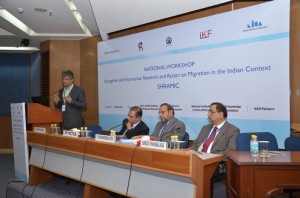
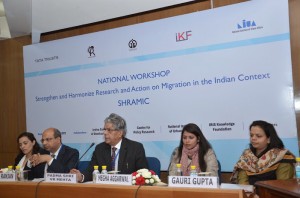
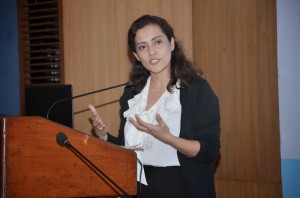
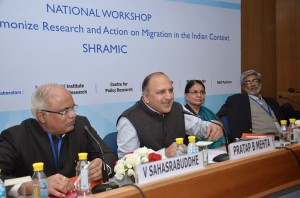
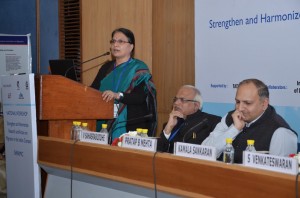
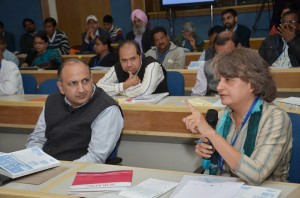
 Posted in
Posted in  Tags:
Tags: